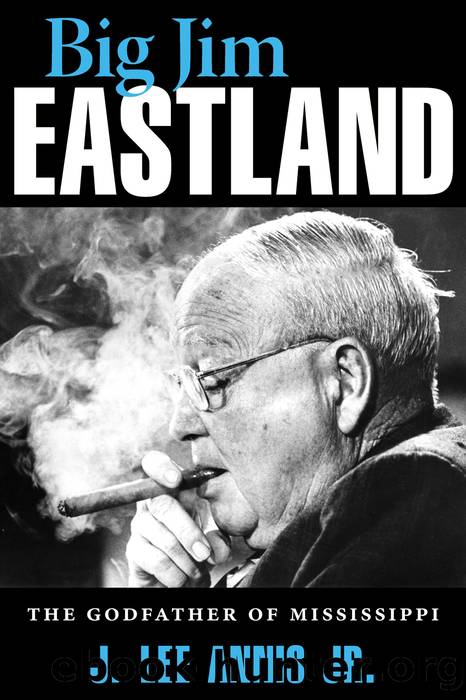Big Jim Eastland: The Godfather of Mississippi by J. Lee Annis Jr

Author:J. Lee Annis Jr. [Annis, J. Lee Jr.]
Language: eng
Format: epub
Tags: Biography & Autobiography, Political, Politics
ISBN: 9781496830845
Google: V_2JzQEACAAJ
Goodreads: 53217466
Publisher: University Press of Mississippi
Published: 2020-12-11T06:43:41+00:00
CHAPTER 14
The Best Chairman
THE ONE AREA WHERE JIM EASTLAND TRULY DISTINGUISHED HIMSELF IN the eyes of his peers was at the helm of the Judiciary Committee. âYou will have the best chairman in the Senate,â Nicholas Katzenbach told liberal Maryland Republican Charles McCurdy âMacâ Mathias, after Mathias learned he would get a seat on that panel in 1969. In any given year, the Judiciary Committee conducted between 45 and 60 percent of all Senate committee business, handling everything from antitrust matters to the confirmation of every nominee to a federal prosecutorial office or judgeship in every state and territory. Civil rights issues were most often the salient ones during the first decade of Eastlandâs chairmanship. While the Washington Post opined when he retired that he did all he could to âblock or retard the ⦠liberation of his region and then of the country as a whole from the shackles of government-sanctioned, culturally blessed institutional racism,â their frequently liberal editorial board also saluted him for a standard of fairness that successors like Edward Kennedy would be âhard-pressedâ to uphold. Playing it âfair down the lineâ was as much a strategy as a practice for Eastland. âBecause he is so zealous in interpreting the rules fairly,â Courtney Pace wrote, âthey cannot become irked when he uses those same rules themselves.â Eastland, one liberal declared thankfully, was ânot like some of those high-minded ones who beat you by calling a vote when you are in the menâs room.â1
Still, in the eyes of some like Ernest F. âFritzâ Hollings of South Carolina, Eastland âcontrolled that committee,â in part by crafting a gruff public image. His chief prop was a cigar, and he was quite generous in sharing his Havana treats with favored colleagues like Robert and Edward Kennedy and committee staffers like Rufus Edmisten, Sam Ervinâs eyes and ears. At executive sessions, some lit up less expensive stogies that would fill the room in a manner that brought to mind the oft-derided smoke-filled rooms of a previous century. The air was thick enough one day that Howard Metzenbaum, the fairly junior Ohio liberal, looked at Joseph Biden, the first member he spotted, and asked him to put âthat out.â Yet while the air remained thick and musty, the only one puffing when Metzenbaum made his request was Eastland. Metzenbaum backed off when he recognized this was the case. âOh, not you, Mr. Chairman,â he backslid sheepishly.2
The prime executive branch nominee who came under the purview of his committee was the attorney general. Eastland, from the moment each nominee was chosen, took care to create a collegial relationship with all who would serve as the chief law enforcement officer of the American government. In his initial meeting with each, he made it clear that he needed two promises. He urged them to keep his friend John Duffner high on their staff, for Duffner had long been his top source of information on who was being considered for judgeships. And, he insisted that they return his phone calls.
Download
This site does not store any files on its server. We only index and link to content provided by other sites. Please contact the content providers to delete copyright contents if any and email us, we'll remove relevant links or contents immediately.
| General | Discrimination & Racism |
Nudge - Improving Decisions about Health, Wealth, and Happiness by Thaler Sunstein(7706)
The Fire Next Time by James Baldwin(5444)
iGen by Jean M. Twenge(5415)
Adulting by Kelly Williams Brown(4574)
The Sports Rules Book by Human Kinetics(4386)
The Hacking of the American Mind by Robert H. Lustig(4383)
The Ethical Slut by Janet W. Hardy(4253)
Captivate by Vanessa Van Edwards(3839)
Mummy Knew by Lisa James(3691)
In a Sunburned Country by Bill Bryson(3542)
The Worm at the Core by Sheldon Solomon(3487)
Ants Among Elephants by Sujatha Gidla(3467)
The 48 laws of power by Robert Greene & Joost Elffers(3291)
Suicide: A Study in Sociology by Emile Durkheim(3022)
The Slow Fix: Solve Problems, Work Smarter, and Live Better In a World Addicted to Speed by Carl Honore(3009)
The Tipping Point by Malcolm Gladwell(2922)
Humans of New York by Brandon Stanton(2873)
Get What's Yours for Medicare: Maximize Your Coverage, Minimize Your Costs by Philip Moeller(2730)
Handbook of Forensic Sociology and Psychology by Stephen J. Morewitz & Mark L. Goldstein(2705)
